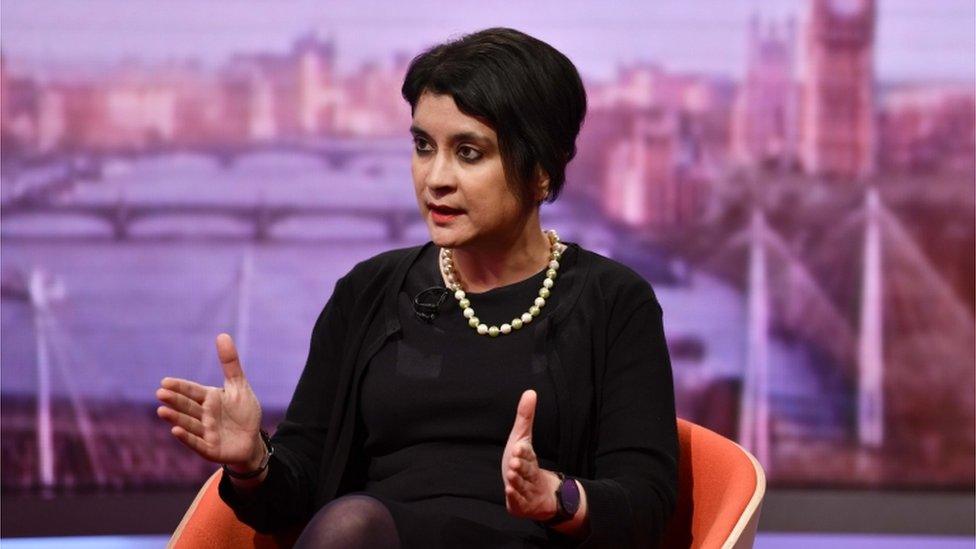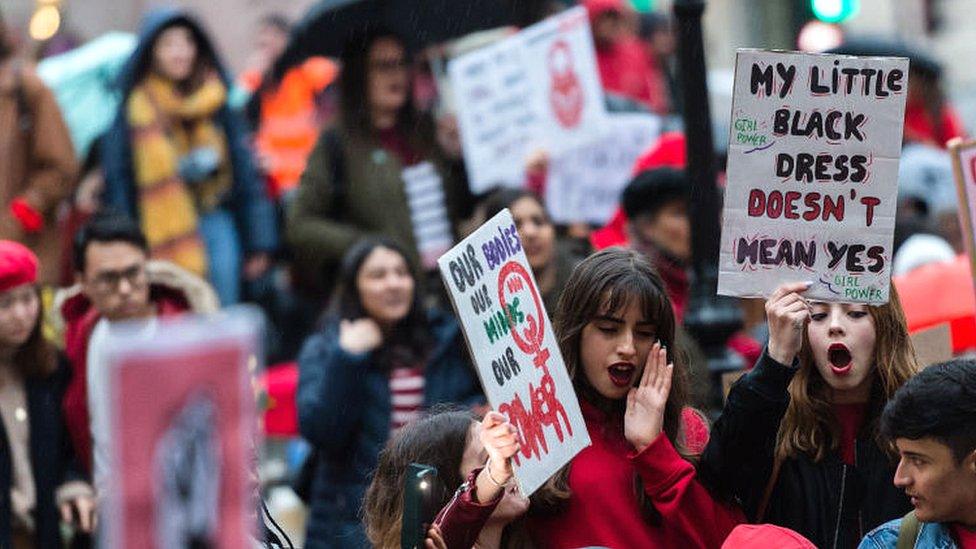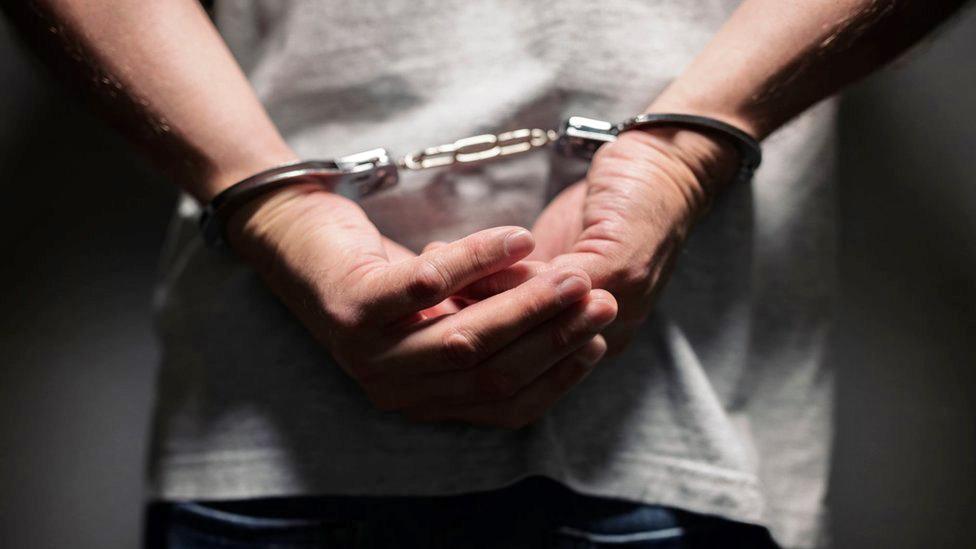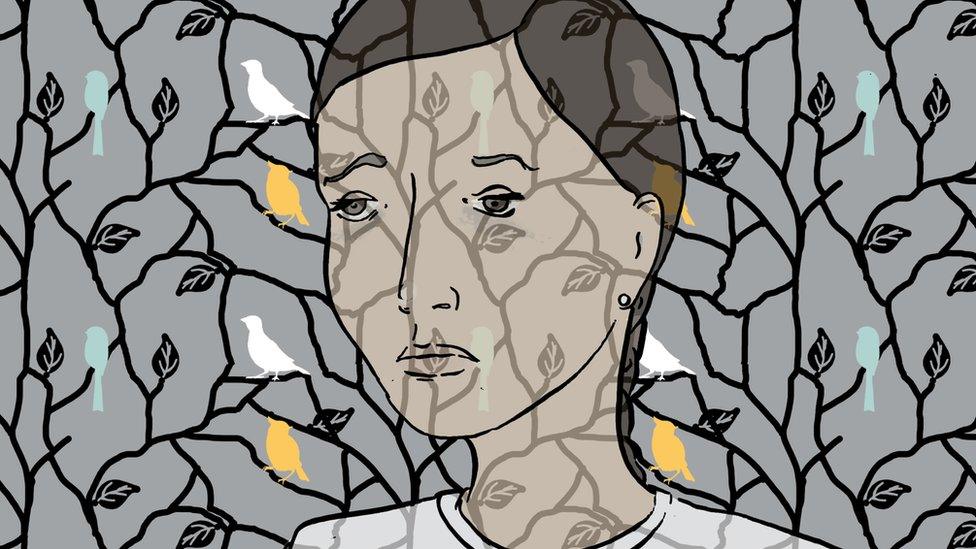Rape victims' therapy guidance needs urgent review - Labour
- Published

Shadow attorney general Shami Chakrabarti says current CPS guidance is "cruel"
Labour is calling for an urgent review into therapy for rape victims, amid claims the current guidance discourages people from seeking counselling.
CPS guidance, external states complainants should avoid discussing details of their abuse with a therapist while a trial is ongoing and that therapy notes could be used as evidence in court.
Shadow attorney general Shami Chakrabarti said this was "cruel".
The government said guidance "actively encourages" therapy for victims.
Labour's move follows a Vice investigation, external, which claimed rape victims were being told not to seek full therapy by police and specialist services.
The guidance is aimed at those involved in arranging therapy, therapists and lawyers involved in making decisions in relevant cases in England and Wales. It was introduced in 2002, when Labour was in government.
It says that pre-trial discussions of alleged sexual assault "may lead to allegations of coaching and, ultimately, the failure of the criminal case", and advises that therapists should avoid exploring in detail the substance of the specific sexual assault allegations.
It also states that records of therapy "must be maintained so they can be produced if required by the court".
The guidance adds, however, that aspects of the therapy that "have no material relevance to criminal proceedings will not have to be disclosed".
Separate CPS guidance from 2012, external on prosecuting rape cases states that victims "should not feel reluctant to seek professional assistance".
Whether they should receive therapy before a criminal trial is "not a decision for the police or the CPS", it adds, although the CPS should be informed if therapy is either proposed or undertaken.

Chantel's story: 'Devastating and frustrating'
Chantel - not her real name - says she was raped and reported it to police "literally hours" after the alleged incident took place.
However, she said she was told by a specialist sexual assault centre that she could not have counselling but only limited pre-trial therapy, until any criminal case was over - because her therapy notes "could be used against her" in court.
"I was just really disappointed and I felt really alone," she told the BBC.
"I felt like I was doing the right thing - I'd reported it straight away. It was hard enough wanting to speak about it in the first place."
"I felt like I was being brave enough to ask for the help," she said.
"It was devastating but also frustrating because I really needed the help and was asking for it but wasn't receiving it."
Chantel said that while those involved in her pre-trial therapy were "doing their best to help" there was "a system in place that doesn't support you".
"While I can talk about how I'm feeling now or last week I can't relate back to why I'm feeling like that," she said.

A spokesman for the Ministry of Justice said a court would only order disclosure of counselling notes "if there were real grounds to believe the evidence could affect the outcome of the case".
Katie Russell, from the charity Rape Crisis, said that while the complainant's consent is generally required to disclose counselling notes, some may feel under pressure to give their consent, fearing their case may be detrimentally affected if they did not.
She said guidelines should be reviewed to consider how relevant counselling notes were to the criminal justice process. While they can be used by the prosecution to support a victim's testimony, she said therapy notes could also be used to "undermine their credibility".
Ms Russell said that while Rape Crisis offered pre-trial therapy and would never encourage or discourage anyone from seeking treatment, it was still "common" for victims to be told by a police officer or sexual assault referral centre that they should not access services.
"At the moment we are in this absurd position where some victims and survivors feel they are being made to choose between their own personal emotional recovery or pursuing criminal justice," she said.
She added that while pre-trial therapy sessions could be helpful for some survivors, for others it could be "enormously frustrating and distressing".
Ms Russell said it was not uncommon for trials to last as long as two years and being unable to access in-depth counselling in this time could add to survivors' emotional distress.
Rape victims' therapy guidance 'cruel', says charity
Rebecca Hitchen, campaign manager for End Violence Against Women, also said the "confusing" and "cruel" guidance should be reviewed.
She told the BBC's Victoria Derbyshire programme it was "shocking" that rape victims were being deterred from accessing "life-saving" specialist support.
Baroness Chakrabarti told BBC Radio 4's Today programme there was evidence women were being "actively discouraged" from seeking counselling because of the "clumsy and contradictory" guidance.
The shadow attorney general said that she had been told by mental health professionals that with appropriate training and guidance, victims should be able to obtain support without risking trials being prejudiced.
"But of course it takes resources to do this properly and that's my fear - that once again you have got a criminal justice system on its knees," she added.
"Corners are being cut and it's the most vulnerable victims that are paying the price."
- Published29 April 2019

- Published27 May 2022

- Published26 September 2018

- Published23 July 2018
